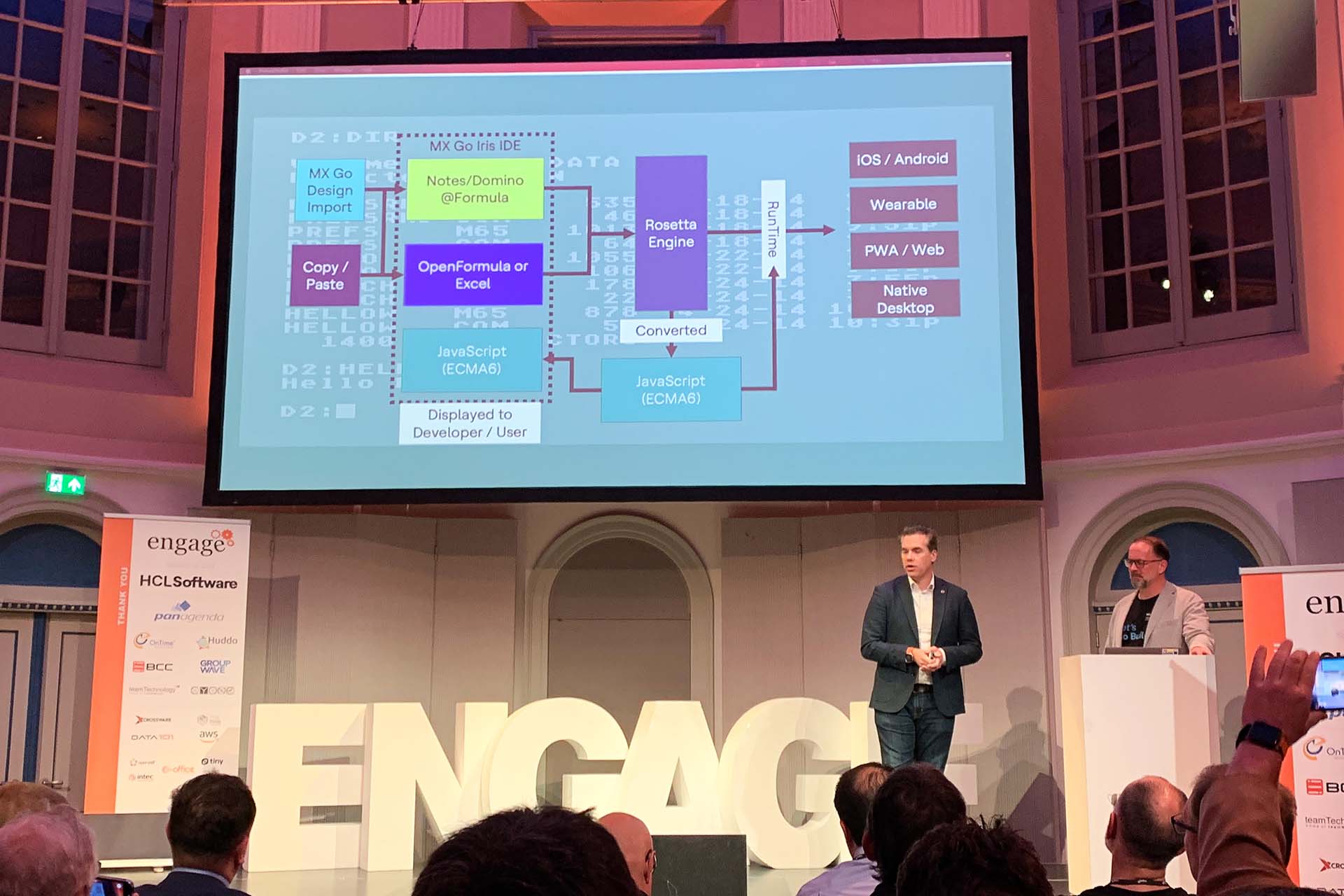
Although HCL is not yet a household name for many, its low-code platforms, such as Volt MX and Domino, are recognized as leading solutions in the low-code market. HCL Software, the provider of these solutions, is a software company with a turnover of 1.4 billion and more than 4,000 employees. Low-code programming allows application projects to be implemented significantly faster and cheaper, without technical constraints. They speed up the development process, save costs and make it easier to maintain applications. You can read more about the benefits and basics of low-code programming in the previously published blog post.
The latest low-code programming solutions could be seen at Engage 2023 event in Amsterdam, with over 300 industry professionals from 28 countries. There were technical workshops, round table discussions, and presentations on new features and developments in HCL platforms. Below is a selection of highlights of new opportunities.
What is it about?
Low-code means faster, more agile and cost-effective software development, using off-the-shelf components and integration services to build functionalities.
MX (multi-experience) refers to the user experience of the same application across multiple digital user experiences, such as websites, mobile apps, chatbots, augmented and virtual reality, and wearable devices such as smartwatches. MX applications can use different forms of interaction: touch, sound, sight, and movement.
HCL Volt MX – Low-code programming for projects of all sizes
HCL Volt MX is a low-code development platform that provides a powerful solution for application developers. It enables the implementation of MX applications not only on web browsers but also on different device platforms such as iOS and Android smartphones, tablets, and smartwatches.
The core idea of Volt MX is to produce an application for all environments and devices from a single code. This brings significant speed and efficiency to all types of Low-code/MX implementations and their ongoing maintenance.
The latest version 9.2 of Volt MX also supports the Microapp architecture, which allows complex projects to be split into independent and testable micro-applications that can eventually be assembled into a package for the user. The Volt MX platform will soon also allow native Windows, Linux, and Mac applications to be implemented, providing a comprehensive set of possibilities for different operating environments, from browsers to smart devices and even desktop operating systems.
HCL Domino – a platform for applications
Domino is a comprehensive package that includes a low-code development and runtime environment as well as many other services such as directory, data security, HTTP, and email services. A recent Forrester study shows the impressive benefits of Domino. It delivered an astonishing 392% ROI for customers, while also improving application development efficiency by 50%. HCL Domino has served customers as a platform for mission-critical business applications for two decades.
Do know what HCL Domino enables today?
- The HCL Notes Client software is no longer required. Both new and old Notes applications can now be used with a browser, without any changes in the code.
- The apps also work on smartphones and tablets without any code changes. Databases can even be replicated to devices for offline use.
- HCL Domino is cloud native. Local servers can be transferred to cloud platforms as containers or even Kubernetes clusters if desired.
- HCL Domino now also serves as a no-code platform (HCL Domino Leap), which enables application development without coding for so-called citizen developers. It can be used, for example, to convert existing Excel spreadsheets into responsive browser applications with a few mouse clicks.
- HCL Domino comes with REST API services that allow Domino applications to integrate with any backend system and cloud service.
HCL Volt MX Go – Domino apps natively on smart devices
HCL Volt MX Go is an extension to the Volt MX platform to be released this fall, offering full support for Domino servers and their applications. Volt MX Go also includes the new programming languages VoltScript and VoltFormula, which allow the logic of existing Notes applications to be transferred directly from Domino to Volt MX. This provides the ability to fully extend existing Notes applications e.g. to native applications for smart devices and to easily integrate with various back-end systems such as AD, SQL databases, SAP, file systems, and cloud platforms. HCL Volt MX Go is aimed as an extension for existing Domino customers, who are now offered it at a competitive price.
Pinja – an experienced low-code programming supplier
Pinja implements and maintains numerous application projects using HCL’s low-code platforms. The user gets solutions that help companies build fast and agile systems that can be maintained on all devices and operating modes, without technical limitations and with low-code principles. Pinja’s experts have extensive experience in building new applications and providing continuous maintenance for them. Feel free to contact us to discuss how low-code programming can help you.
Read more
HCL services
Low-code application development revolutionizes programming with its speed, ease and versatility
Three reasons to start using a DevOps approach in software work

Jarkko Pietikäinen
I’m responsible for HCL business and the development of related digital services. I came to this job in 2018 when Netwell Oy, a company I started 25 years ago, was merged with Pinja. In my free time, I boat, dabble in ham radio activities, ski and cycle.
Back to the Pinja Blog
Categories
- Career at Pinja (68)
- Manufacturing (46)
- Knowledge Management (45)
- Production Development (44)
- Software Partnership & Tools (42)
- Sustainability (37)
- Wood and Forestry (37)
- Bioenergy and Recycling (29)
- IT Support and Outsourcing (24)
- Ecommerce (23)
- Maintenance (22)
- Artificial Intelligence and Machine Learning (15)
- Public Services (9)
- Compliance (1)
